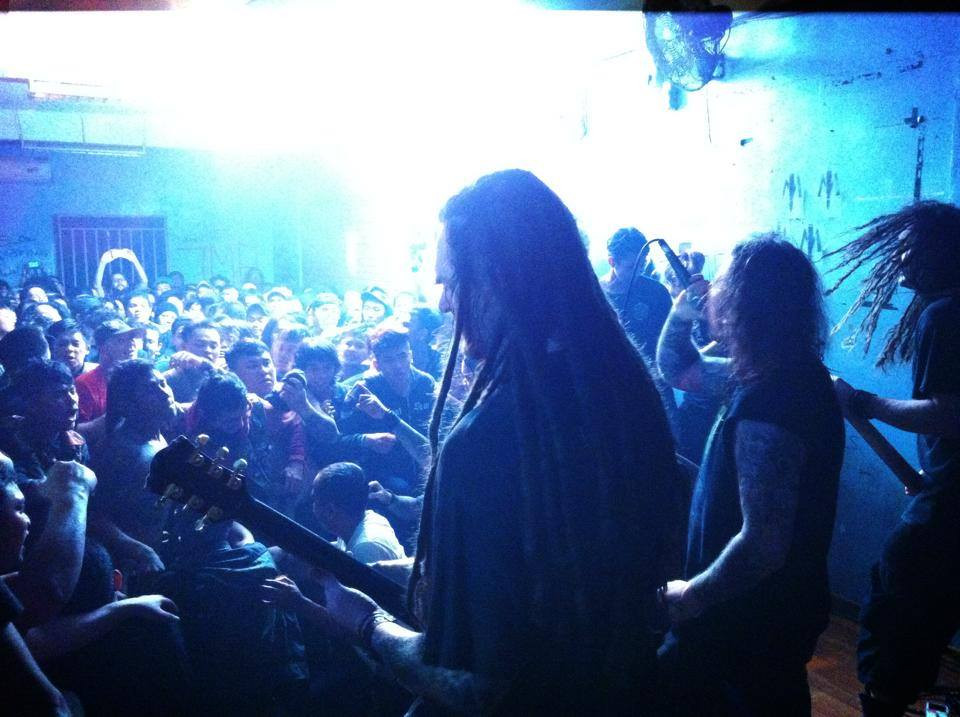Popular Reads
Top Results
Can't find what you're looking for?
View all search resultsPopular Reads
Top Results
Can't find what you're looking for?
View all search resultsTaste of punk and hardcore in South Jakarta
Change text size
Gift Premium Articles
to Anyone
I
n South Jakarta, among the shops and offices that line Jl. Fatmawati, sits Rossi Musik, a live music venue and cultural landmark for the Indonesian underground scene.
For more than a decade, Rossi Musik has been one of the few safe havens in Jakarta for those looking for underground and indie music shows.
The concrete building that houses it is nondescript, almost hidden, and only the graffiti that lines the entrance and inside hallways, having clearly accumulated over a long history, indicates that you have arrived.
The four-story building has two stages, one for smaller, more intimate shows and another in a larger hall that can fit more than 400 people. It is also home to a record store, a recording studio and a bar that overlooks the street from the top floor.
Rossi Musik is a family business owned and operated by Sayiba Rahmat and his brother. For more than two decades the building has served Jakarta’s independent music scene. It opened in 1994 as a record store upstairs from a school and was at the time run by Sayiba’s father.
When Sayiba took over the business in 2005 he decided to experiment by hosting live shows, a choice he said was inspired by his experience as a musician. When the venue first opened it hosted mainly punk and hardcore shows.
“At the beginning I think it surprised people,” Sayiba said.
“Suddenly there were all these punk and hardcore shows [...] People are used to it and now it's normal.”
Starting a venue from scratch was hard and Sayiba admitted that the first few years of hosting shows had a lot of trial and error.
“When I first started working, I didn’t know the rules. I did not even know that when you have a show you needed a permit from the police. So, I learned a lot from just doing it,” he said.
“It was hard and there was not much profit, but right now it is more stable. I think we are in a good position with the community and the authorities.”
A lot of underground Indonesian music, specifically punk, can be seen as having been an expression of anti-regime angst from the youth living under dictator Soeharto, who ruled Indonesia under his iron-fist New Order regime from 1966 to 1998.
Jeremy Wallach, writing for Norient, said that, “Indonesian underground music, once dismissed by many grownups as a fad or evidence of outright brainwashing by Western corporations, had become the soundtrack for an activist youth movement that helped topple an entrenched 32-year military dictatorship and start Indonesia on an ultimately successful road to democracy.”
This was in a time before social media, mobile phones, or widespread implementation of the internet. Sayiba said that during his 13 years of running Rossi Musik the advent of social media made the underground scene less insular, both internally and from the outside world.
“When I started in 2005 there was still a lot of street punk stuff, but it was all about emo. It depends on the trend.”
Gradually the lines between genres in the Indonesian underground scene started to blur, partly because of the advent of social media, which provided listeners with a wider variety of music. Sayibah has seen this phenomenon happen first hand.
“I think it’s the first time anyone can like every type of music and there’s no borders,” he said.
“So now punk can hear indie and metal can hear electronic, so there is a lot of overlap. Right now is a very good environment for Jakarta’s music.”
Rossi Musik provides a good platform for smaller local bands to get their first show and for those new to the scene to see their first show. In the past Jakarta was passed over by many international acts, since it was too hard to host shows in the capital and they were not profitable enough.
This is changing as Rossi Musik and the local scene are build bigger names for themselves.
Most recently, Rossi Musik hosted American hardcore band Tragedy and Australian noise-punk group Enzyme. With the internet providing an open line of communication to bands, Indonesian listeners can direct bands to go to Jakarta, where they may have otherwise not recognized they had a following.
Unlike many other places, underground shows in Jakarta are very intimate. You can always meet the band hanging around after a show.
The Jakarta underground music scene thrives on communication.
Most venues in Jakarta have a very small social media presence and rely on word of mouth to circulate news of events and upcoming shows. From there fans spread the message online.
Sayibah stressed the importance of communication and knowing your local community.
There is a sense that a venue has a responsibility to manage the masses of people that come through. Perhaps this is why Rossi’s has persisted for more than 13 years, while many other underground venues have come and gone, usually because of financial difficulties.
“A lot of people feel like Rossi’s is their second home. So, if there’s a fight or some trouble they always say: ‘Hey, don’t you fight in here because if there’s a problem in Rossi’s, where else can we have shows?’” Sayibah said. (hdt)
The writer is an intern at The Jakarta Post.











